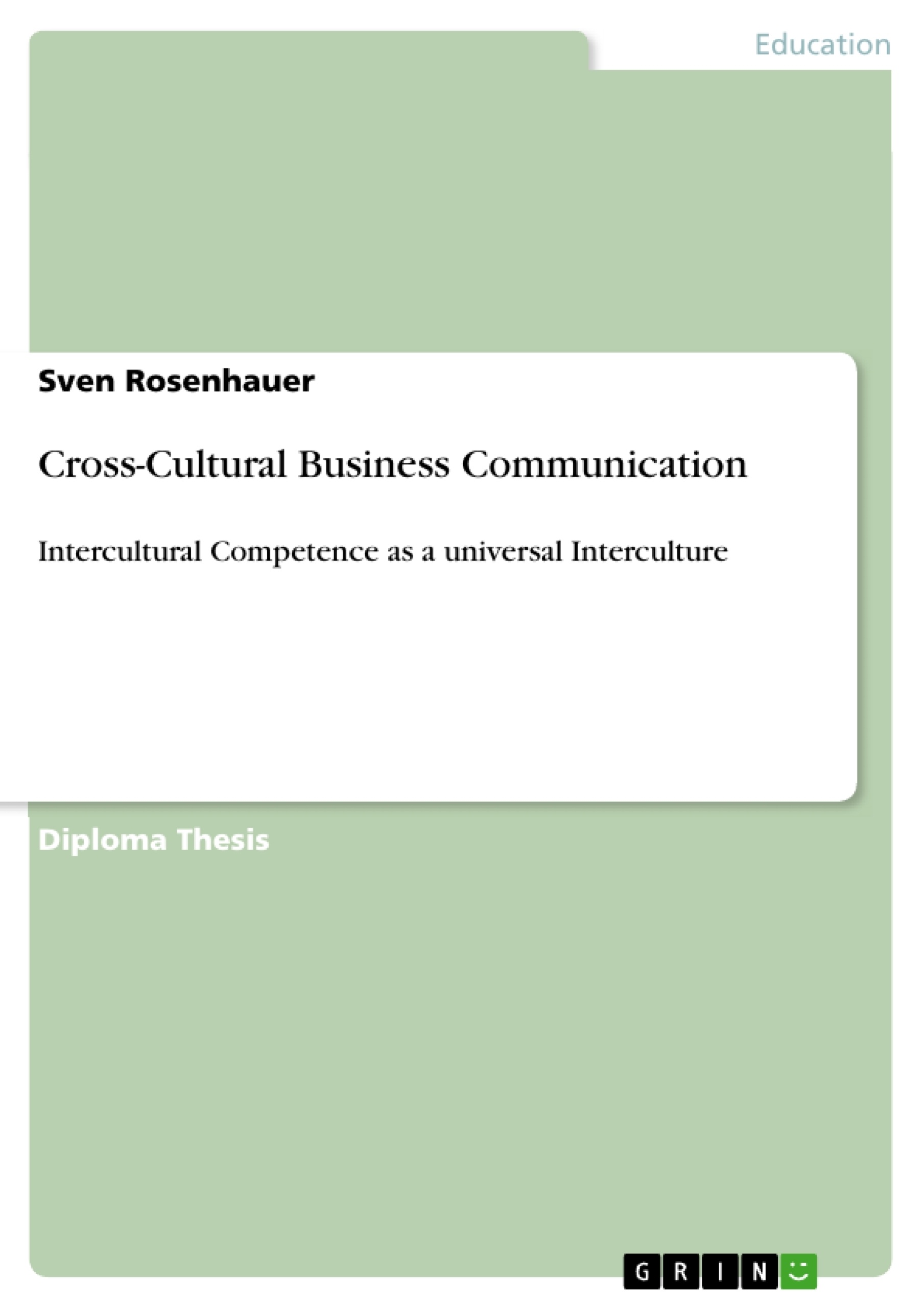
Cross-Cultural Business Communication
Diplomarbeit, 2007
216 Seiten, Note: 1,0
Leseprobe
Table of Contents
- 1 Introduction
- 1.1 Purpose of the Present Thesis
- 1.2 Structure of the Present Thesis
- 2 Case Study
- 3 Culture and its Implications
- 3.1 Definition of Culture
- 3.2 Cross-Cultural Comparative Research Theories
- 3.3 Cross-Cultural Comparative Research Studies
- 3.3.1 Hofstede
- 3.3.2 Trompenaar & Hampden-Turner
- 3.3.3 Lane, DiStefano & Maznevski
- 3.3.4 The GLOBE Research Project
- 3.4 The Cultural Orientation Framework
- 4 Communication and its Implications
- 4.1 Definition of Communication
- 4.2 Concepts of Communication
- 4.3 Levels of Communication
- 4.3.1 Verbal Communication
- 4.3.2 Non-verbal Communication
- 4.4 Cultural Dimensions and Communication Patterns
- 5 Hypotheses
- 6 Research Methodology
- 6.1 Research Approach
- 6.2 Research Design
- 6.2.1 Research Sample Selection
- 6.2.2 Research Data Collection
- 6.3 Strengths and Limitations of Research Methodology
- 7 Analysis
- 7.1 Analysis 1 - Acculturation
- 7.1.1 Theoretical Background
- 7.1.2 Evaluation of Empirical Findings
- 7.1.3 Conclusion
- 7.2 Analysis 2 - Convergence in Communication
- 7.2.1 Theoretical Background
- 7.2.2 Evaluation of Empirical Findings
- 7.2.3 Conclusion
- 7.3 Analysis 3 - Intercultural Competence
- 7.3.1 Theoretical Background
- 7.3.2 Evaluation of Empirical Findings
- 7.3.3 Conclusion
- 7.4 Conclusion and Discussion of Analysis
- 7.1 Analysis 1 - Acculturation
Objectives and Key Themes
This thesis examines the convergence of cultures in international business and the role of intercultural competence in this process. It explores theoretical and practical aspects of culture, its differences, and its measurement, focusing on communication as a key area where cultural differences are evident. The study investigates whether the soft skills of intercultural competence contribute to the development of a universal business culture and communication style.
- Cultural convergence in international business environments.
- The impact of intercultural competence on communication and business interactions.
- The potential emergence of a universal business culture and communication style.
- Analysis of existing cross-cultural communication theories and research.
- Case study examination of a culturally diverse organization.
Chapter Summaries
Chapter 1: Introduction introduces the topic, highlighting the increasing globalization of business and the growing demand for intercultural competence. It outlines the thesis's objective and structure.
Chapter 2: Case Study presents a case study of the United Nations, illustrating a global workplace with cultural diversity and its associated challenges and influences.
Chapter 3: Culture and its Implications delves into the definition of culture, exploring relevant cross-cultural comparative research theories and studies (Hofstede, Trompenaar & Hampden-Turner, Lane, DiStefano & Maznevski, and the GLOBE project) and a cultural orientation framework.
Chapter 4: Communication and its Implications examines the definition and concepts of communication, including verbal and nonverbal aspects, and their relationship to cultural dimensions and communication patterns.
Chapter 5: Hypotheses presents the hypotheses that will guide the research.
Chapter 6: Research Methodology details the research approach, design, sample selection, data collection methods, and limitations.
Chapter 7: Analysis (Partial): This chapter presents analyses of acculturation, convergence in communication, and intercultural competence, including theoretical backgrounds and evaluations of empirical findings (excluding conclusions and final discussion).
Keywords
Intercultural competence, cross-cultural communication, cultural convergence, global business, universal interculture, international workforce, communication patterns, cultural dimensions, case study, United Nations.
Frequently Asked Questions
What is the main focus of this thesis on cross-cultural communication?
The thesis examines whether cultures converge in international business environments and how intercultural competence influences this process, focusing on communication patterns.
Which researchers' theories are analyzed in the study?
The research provides an overview of theories from well-known experts such as Hofstede, Trompenaar & Hampden-Turner, Lane, DiStefano & Maznevski, and the GLOBE Research Project.
What organization was used as a case study for cultural diversity?
The United Nations was selected for the field study as it represents one of the most culturally diverse organizations in the world.
What are the levels of communication discussed in the thesis?
The study distinguishes between verbal and non-verbal communication as key levels where cultural differences become apparent in business interactions.
Is there a trend toward a universal business culture?
The thesis examines if intercultural soft skills contribute to the emergence of a "universal interculture" or a standardized global communication style in business.
What is the purpose of the research methodology used?
The methodology aims to expose tendencies that confirm or disprove existing findings in cross-cultural comparative research rather than generating entirely new empirical data.
Details
- Titel
- Cross-Cultural Business Communication
- Untertitel
- Intercultural Competence as a universal Interculture
- Hochschule
- Fachhochschule für Wirtschaft Berlin
- Note
- 1,0
- Autor
- Sven Rosenhauer (Autor:in)
- Erscheinungsjahr
- 2007
- Seiten
- 216
- Katalognummer
- V119450
- ISBN (eBook)
- 9783640236176
- ISBN (Buch)
- 9783640238262
- Dateigröße
- 8303 KB
- Sprache
- Englisch
- Schlagworte
- Cross-Cultural Business Communication
- Produktsicherheit
- GRIN Publishing GmbH
- Preis (Ebook)
- US$ 45,99
- Preis (Book)
- US$ 59,99
- Arbeit zitieren
- Sven Rosenhauer (Autor:in), 2007, Cross-Cultural Business Communication, München, Page::Imprint:: GRINVerlagOHG, https://www.diplomarbeiten24.de/document/119450
- Autor werden
- Ihre Optionen
- Vertriebskanäle
- Premium Services
- Autorenprofil
- Textarten und Formate
- Services für Verlage, Hochschulen, Unternehmen

- © GRIN Publishing GmbH.
- Alle Inhalte urheberrechtlich geschützt. Kopieren und verbreiten untersagt.
- info@grin.com
- AGB
- Open Publishing
Der GRIN Verlag hat sich seit 1998 auf die Veröffentlichung akademischer eBooks und Bücher spezialisiert. Der GRIN Verlag steht damit als erstes Unternehmen für User Generated Quality Content. Die Verlagsseiten GRIN.com, Hausarbeiten.de und Diplomarbeiten24 bieten für Hochschullehrer, Absolventen und Studenten die ideale Plattform, wissenschaftliche Texte wie Hausarbeiten, Referate, Bachelorarbeiten, Masterarbeiten, Diplomarbeiten, Dissertationen und wissenschaftliche Aufsätze einem breiten Publikum zu präsentieren.
Kostenfreie Veröffentlichung: Hausarbeit, Bachelorarbeit, Diplomarbeit, Dissertation, Masterarbeit, Interpretation oder Referat jetzt veröffentlichen!
- GRIN Verlag GmbH
-
- Nymphenburger Str. 86
- 80636
- Munich, Deutschland
- +49 89-550559-0
- +49 89-550559-10
- info@grin.com
-









